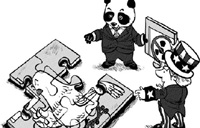WASHINGTON - As the first key US government figure to visit Beijing right after the Chinese Lunar New Year holiday, Secretary of State John Kerry is sure to receive a warm welcome when he gets there Friday.
In such a festive time, there are high hopes among many Chinese that the two-day trip, coming at the start of the Year of the Horse, bodes well for the China-US ties, one of the most important bilateral relationships in the world.
Talks between Kerry and the Chinese leaders are expected to be focused on how to advance the unprecedented task of building a new type of major-country relationship between the two nations that features pragmatic cooperation rather than hostile strategic competition. That is the consensus reached by Presidents Xi Jinping and Barack Obama at their Annenberg summit last June.
The two sides have been well on track to implementing the consensus in recent months, as demonstrated by the sustained high-level dialogues and consultations, increased people-to-people exchanges and improved military ties.
|
 |
Setting a tone for Kerry's visit, the US State Department has announced he will reaffirm the US commitment to building a "positive, cooperative and comprehensive relationship with China." The two sides will also discuss cooperation on some issues of shared interest, including the Korean Peninsula situation, climate change and clean energy.
In the year ahead, Xi and Obama would have many opportunities to meet each other at various venues such as the Asia-Pacific Economic Cooperation summit in Beijing and the G20 summit in Australia.
The two countries are also expected to hold the sixth Strategic and Economic Dialogue and the fifth High-Level Consultation on People-to-People Exchange, along with exchange visits by top military officials.
Therefore, a key task for Kerry during the upcoming visit will be making preparations and discuss the agenda for the various bilateral events mentioned above.
Of course, in Beijing, the top US diplomat is also expected to hear stern warnings about appeasing an increasingly provocative and bellicose Japan, which is drifting dangerously toward re-militarization under Prime Minister Shinzo Abe.
Acting like a spoiled child, the Japanese leader has been pushing the limits by seeking to break free from the limits of the post-war pacifist constitution and to re-arm Japan, with the aim to make the island nation capable of militarily threatening its neighbors once again.
Abe's dangerous game was being played with the excuse of countering the so-called "China threat" and strengthening the Japan-U.S. alliance, which seems to resonate among some Washington politicians so that they even appear to be willing to give him a free pass.
But any peace-loving American and far-sighted strategist should be clear-eyed about this, because once the genie of Japan's militarism is released from the bottle, the United States will suffer, too.
|
|
|
|
|
|
|
|
